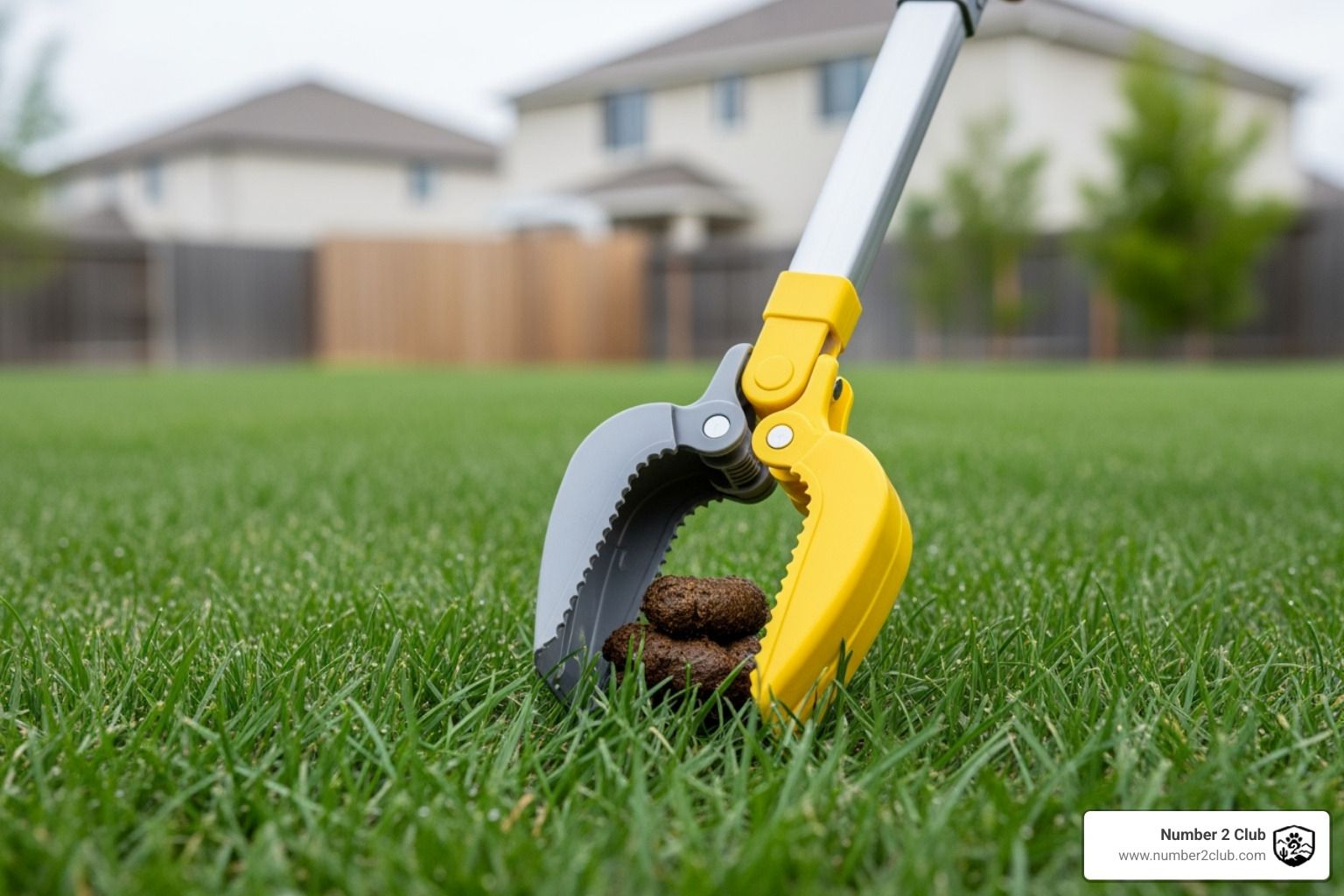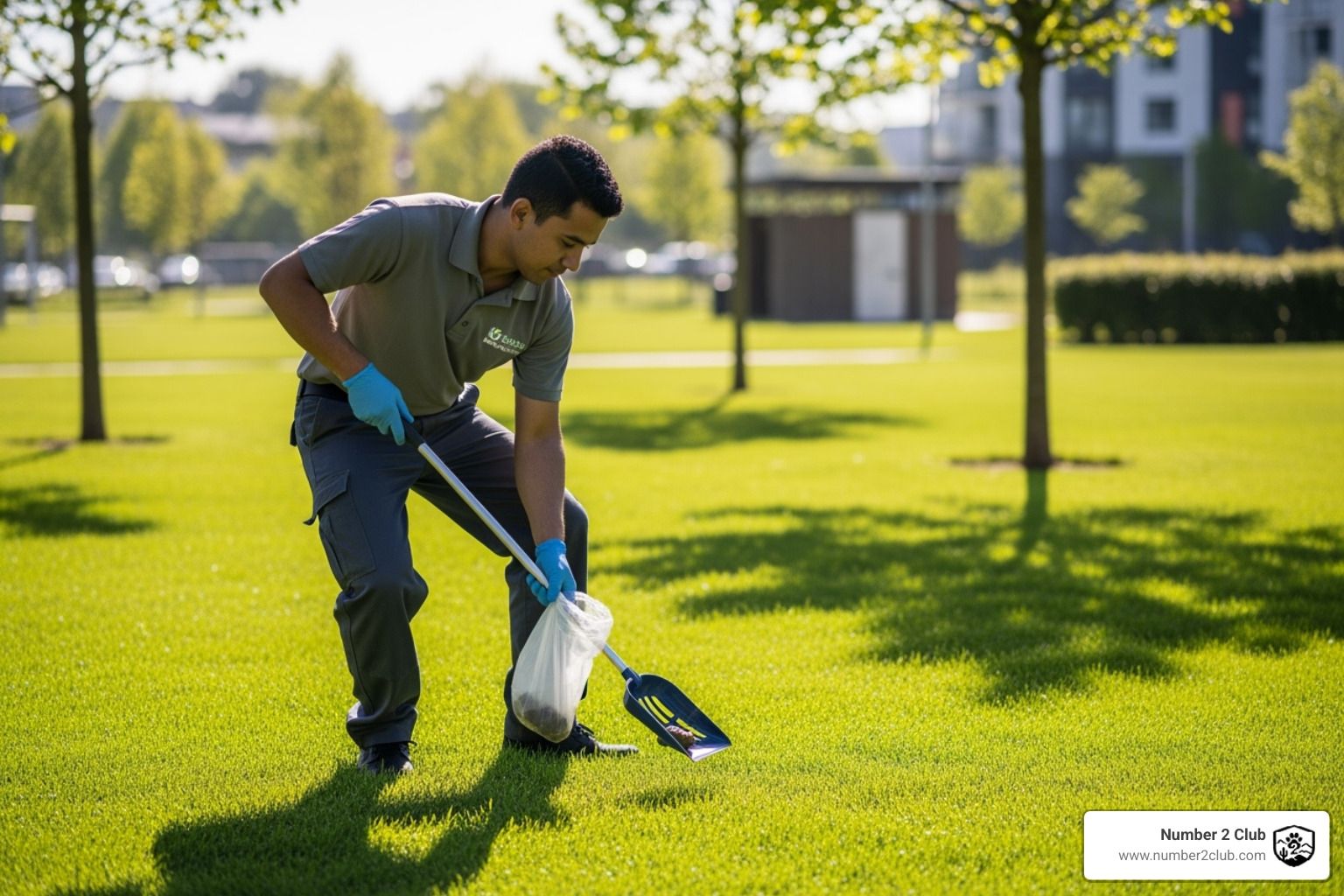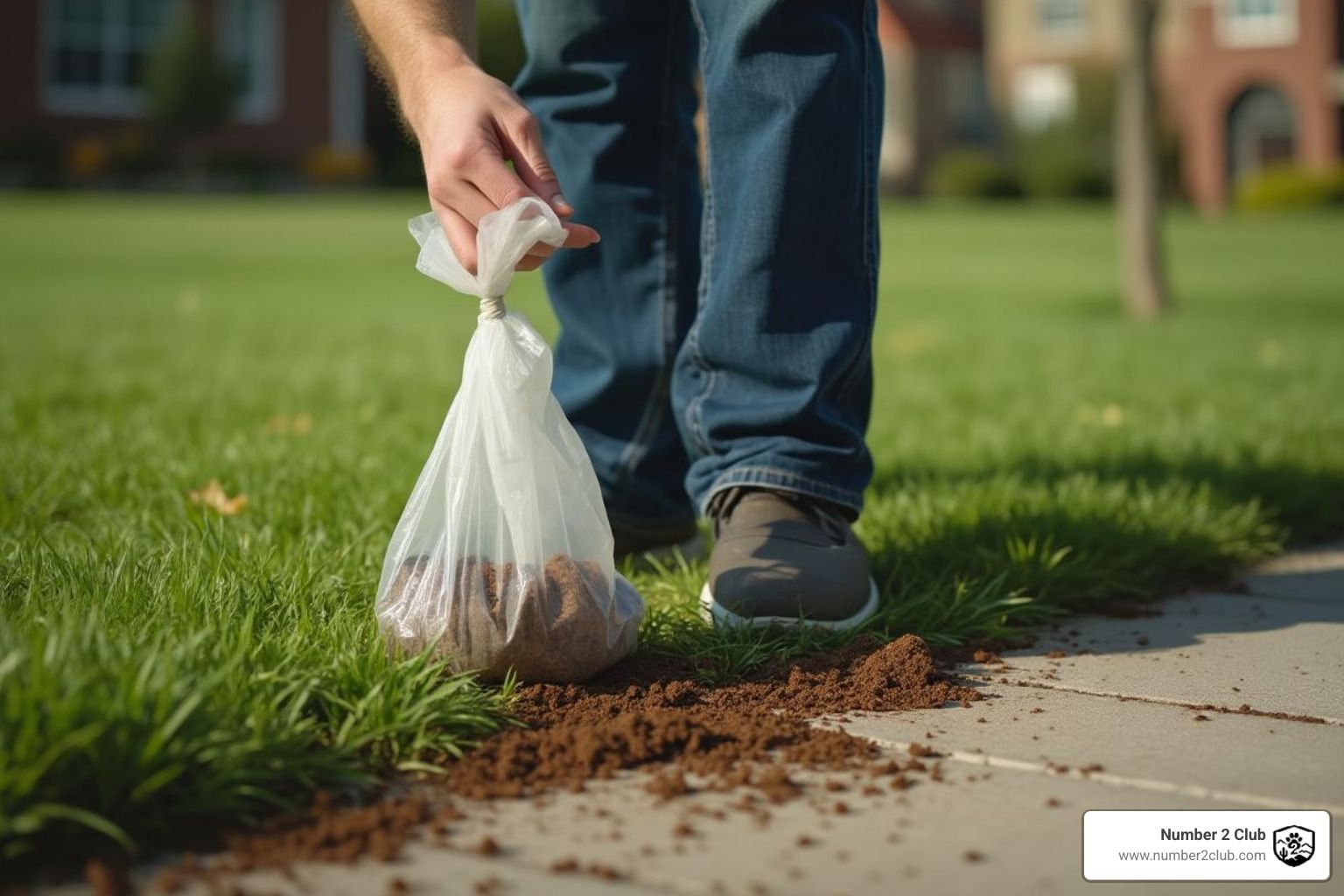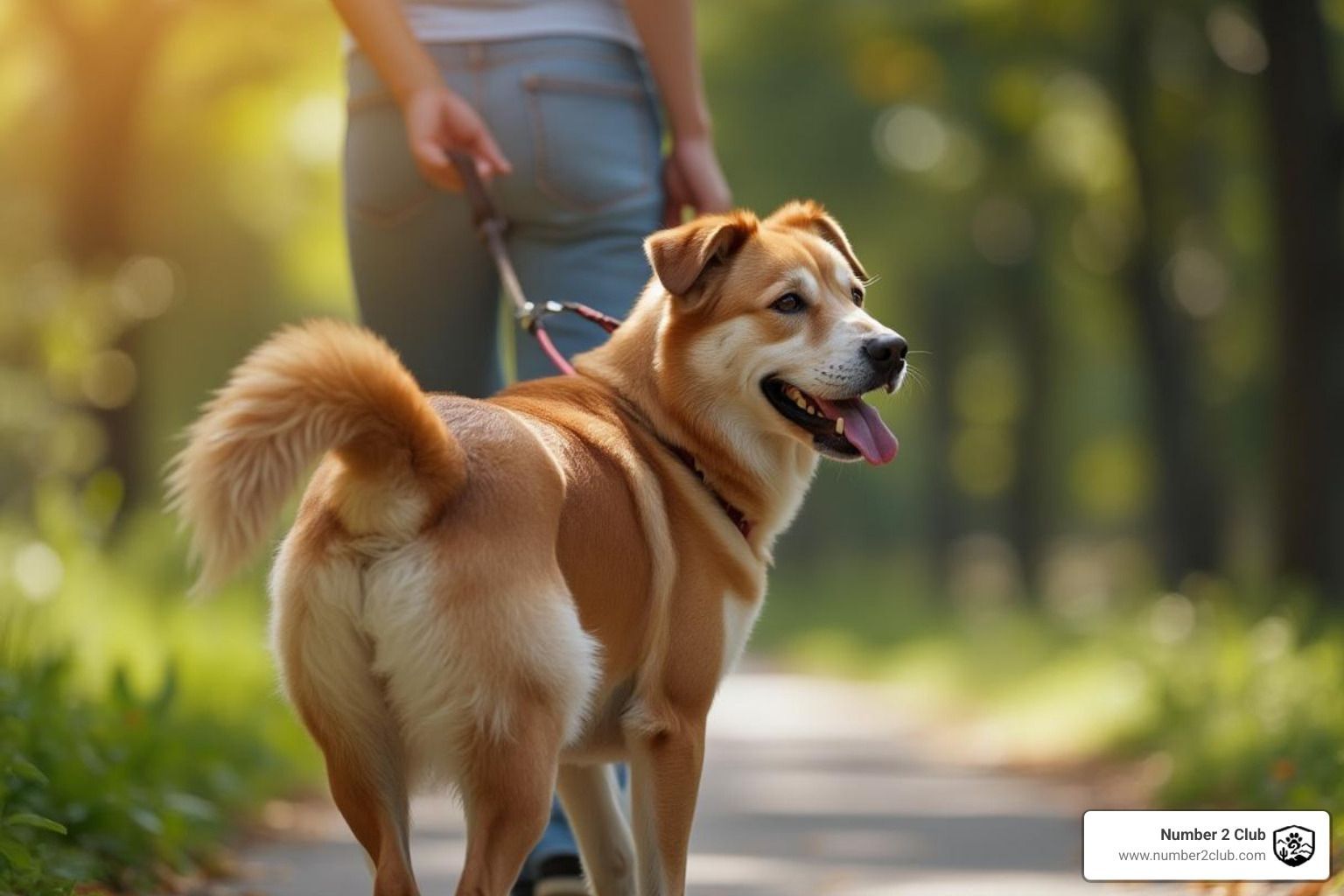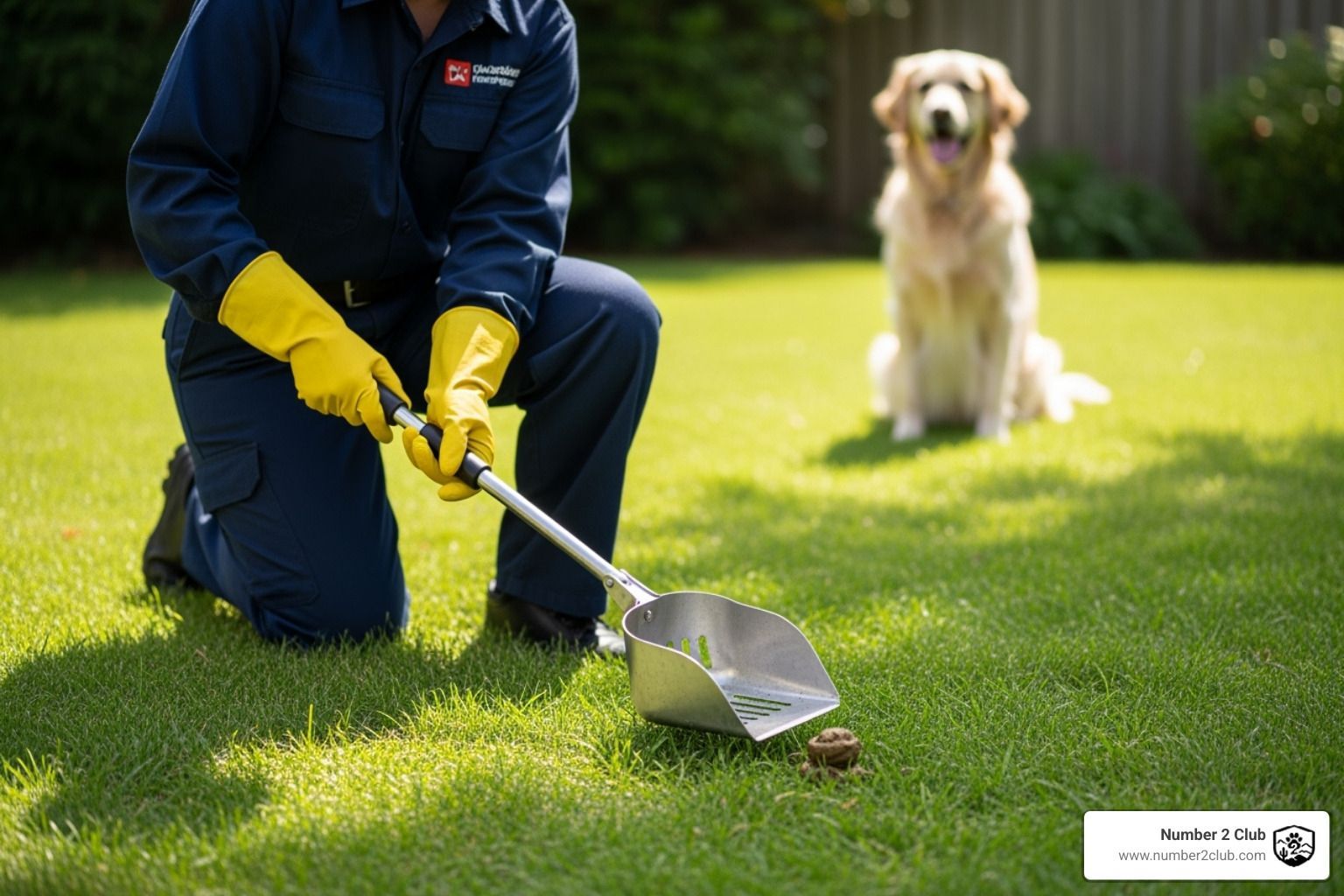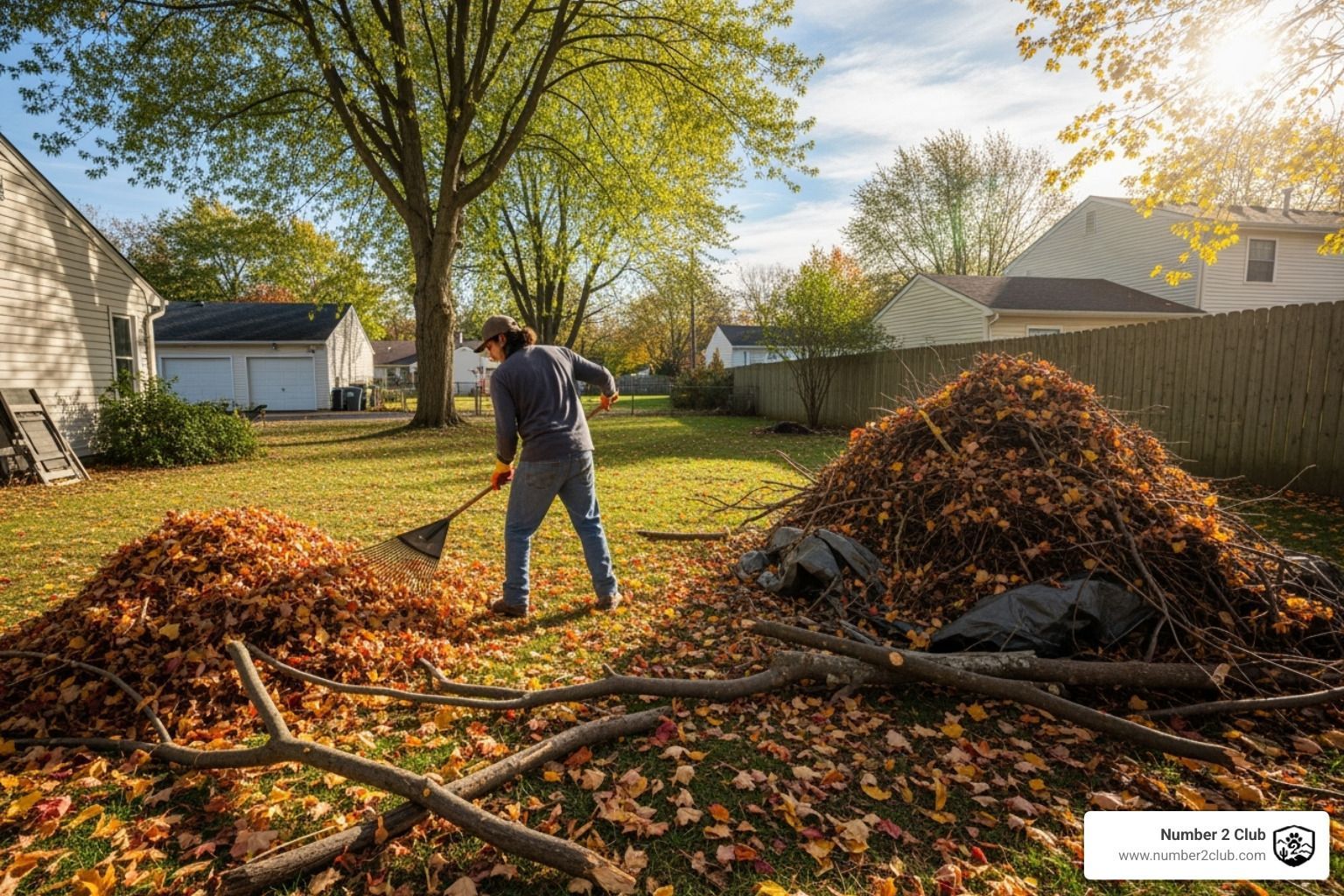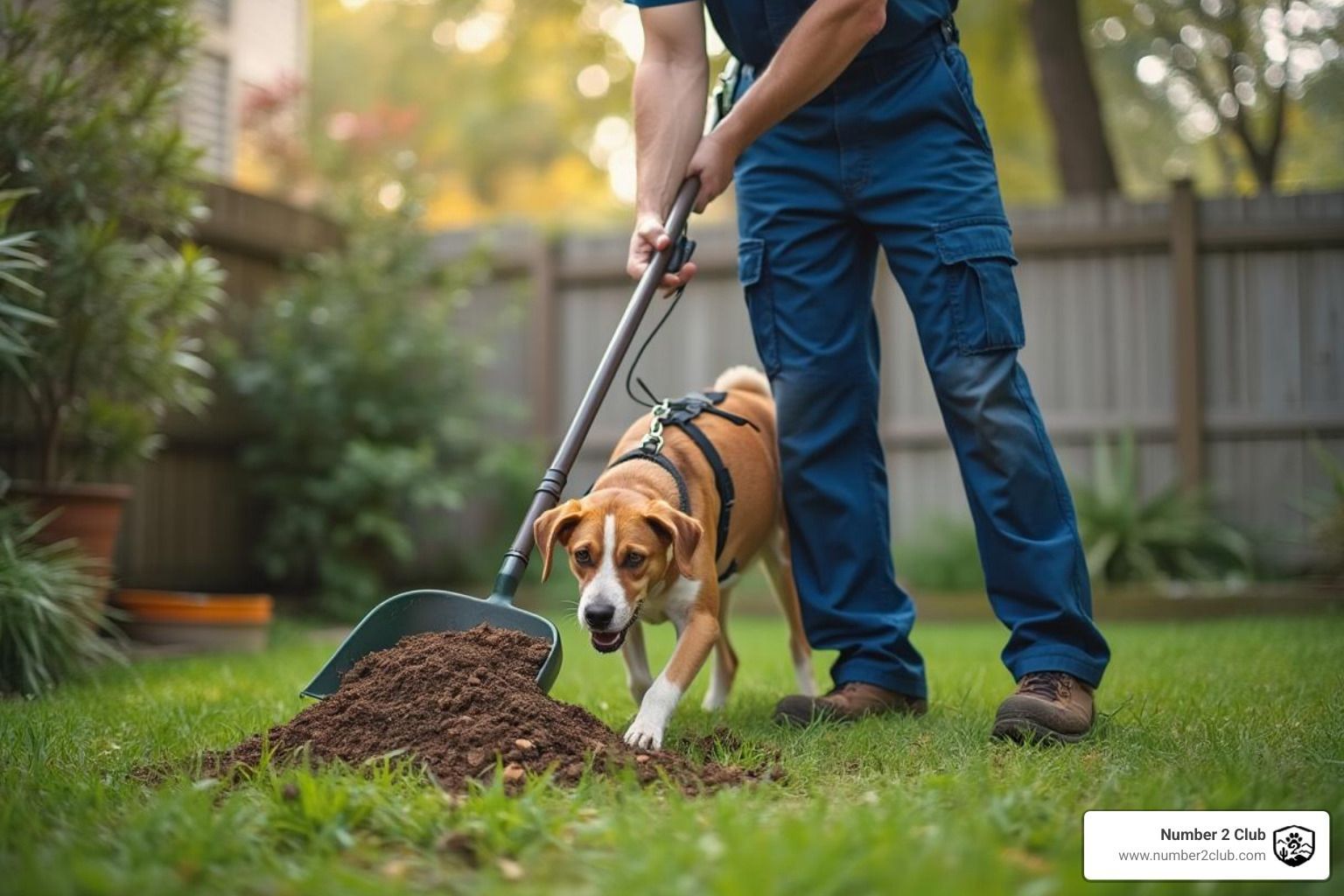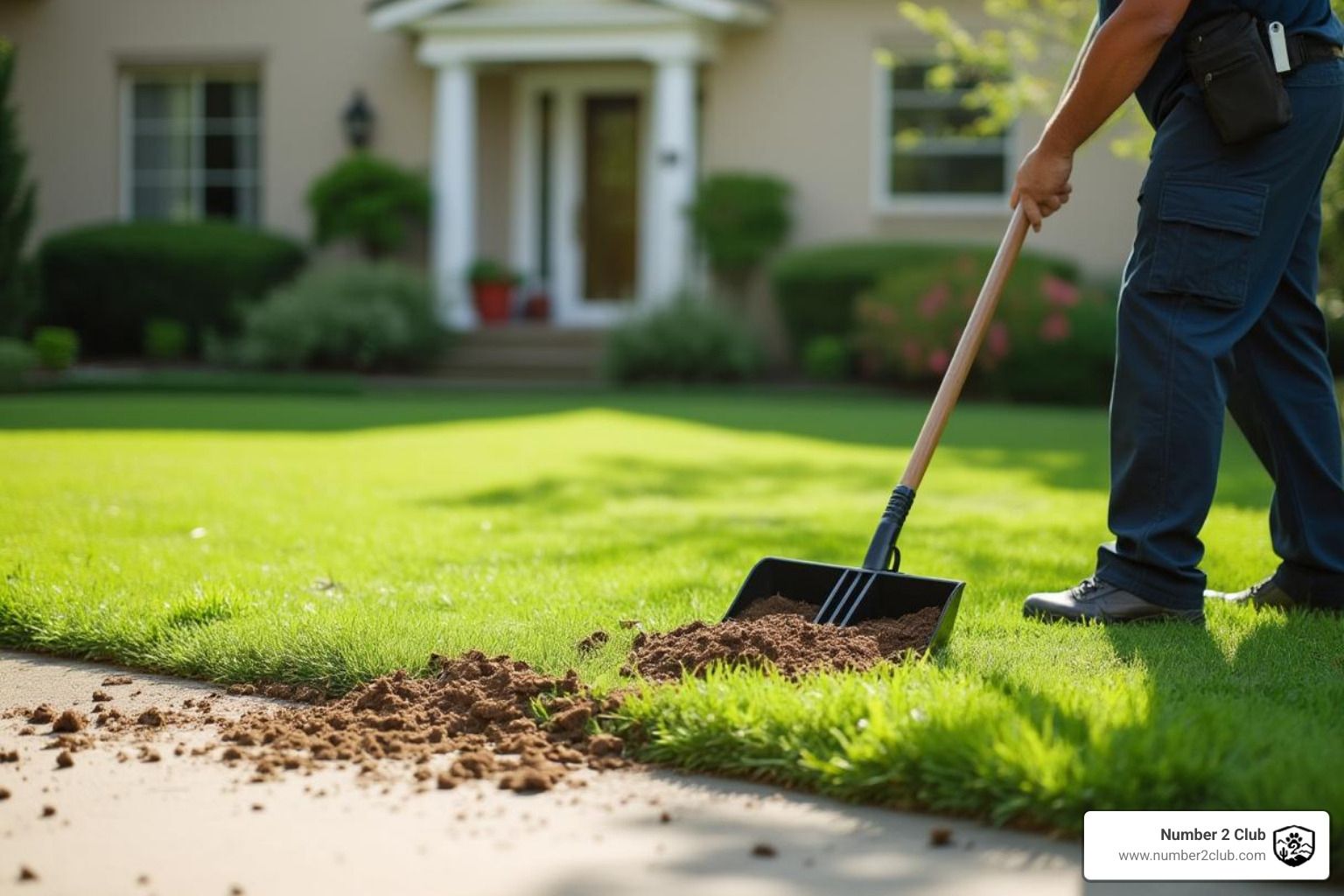Don't Be a Poop Scooper Procrastinator: The Importance of Pet Waste Cleanup
Why Cleaning Up Dog Poop is Essential
Properly handling your pet's waste is vital. When you clean up dog poop, you're doing more than just keeping your yard tidy—you're protecting public health, the environment, and your community.
Here's why cleaning up dog poop is so important:
- Prevents Disease Spread: Dog poop carries harmful bacteria and parasites like Salmonella, E. coli, and various worms that can sicken humans and other animals.
- Protects Waterways: Rain washes waste into storm drains and then into rivers and lakes. This causes harmful algae blooms that damage aquatic life.
- Maintains Clean Spaces: Scooping poop keeps parks, trails, and neighborhoods pleasant for everyone.
- Reduces Odor: Prompt cleanup prevents unpleasant smells in your yard and community.
- Saves Your Lawn: Dog poop is acidic and can burn grass, leaving unsightly brown spots.
While not glamorous, managing pet waste is a key part of responsible pet ownership. This guide will show you how to handle it effectively. As an expert in clean up dog poop, Joseph Lopez nc, from Number 2 Club, helps maintain clean, safe, and odor-free outdoor spaces for residential and commercial clients.
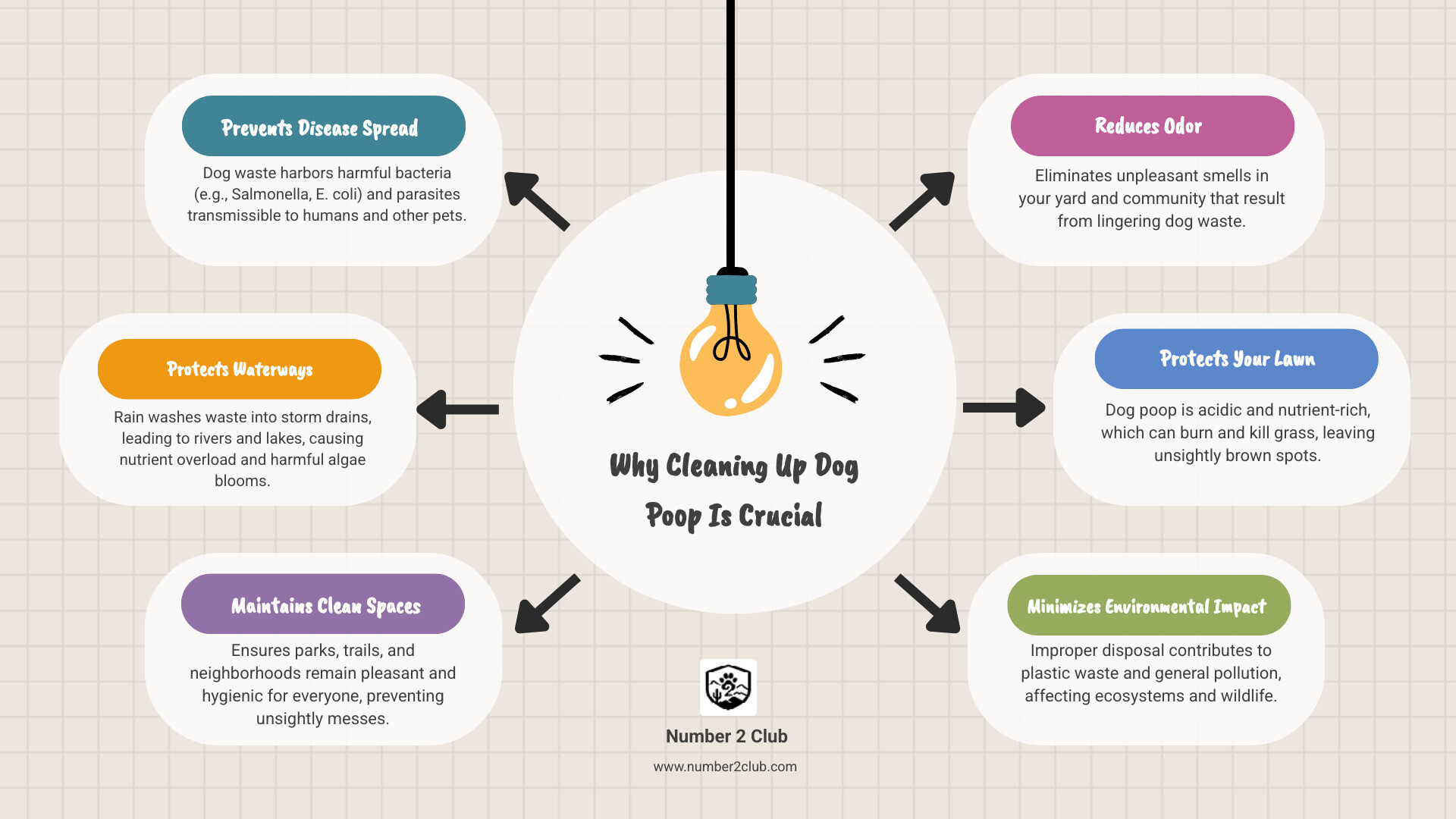
Why Cleaning Up Dog Poop is a Crucial Responsibility
As responsible pet parents, cleaning up after our dogs is a must-do that goes beyond just keeping shoes clean. Ignoring dog waste has a significant impact on our environment, public health, and community.
Environmentally, dog poop is not a fertilizer. It's loaded with excess nitrogen and phosphorus. Rain washes these nutrients into storm drains, which flow directly into streams, rivers, and lakes. This nutrient overload causes harmful algae blooms that deplete oxygen in the water, harming fish and aquatic life.
From a public health perspective, dog waste is a major hazard. It's a leading cause of bacteria in U.S. water systems and can contaminate water sources, making them unsafe for recreation or drinking. It's also a matter of community courtesy. Leaving waste in public spaces is unpleasant, can sour neighborly relations, and is often illegal. A regular clean up dog poop routine also prevents odors and protects your lawn from the acidic waste, which can burn grass and leave brown patches.
The Hidden Health Risks in Your Yard
The most compelling reason for diligent cleanup is the invisible health risks. Dog waste can carry numerous disease-causing organisms, many of which are zoonotic(transmissible from animals to humans). Even a healthy-looking dog can carry these diseases without showing symptoms.
Your dog's waste can harbor serious pathogens, including:
- Salmonella: Causes fever, diarrhea, and cramps in humans.
- E. coli: Certain strains can lead to severe illness, including vomiting and kidney failure.
- Giardia: An intestinal parasite causing severe diarrhea, cramps, and nausea, often spread through contaminated water.
- Roundworms: Their eggs can survive in soil for years. If ingested, they can migrate through the human body, causing serious health issues, including vision loss.
- Hookworms: Larvae can burrow into human skin from contaminated soil, causing rashes and intestinal problems.
Children are especially vulnerable due to their tendency to play on the ground. Simply playing in the yard can expose your family to these risks if waste is left behind. It's crucial to handle every deposit with care.
Pet poop can spread germs to people and pets, as noted by the Centers for Disease Control and Prevention.
The Ultimate Toolkit for Effective Cleanup
To effectively clean up dog poop, having the right tools makes the job more efficient and hygienic. A well-chosen arsenal is essential for thoroughness and safety.
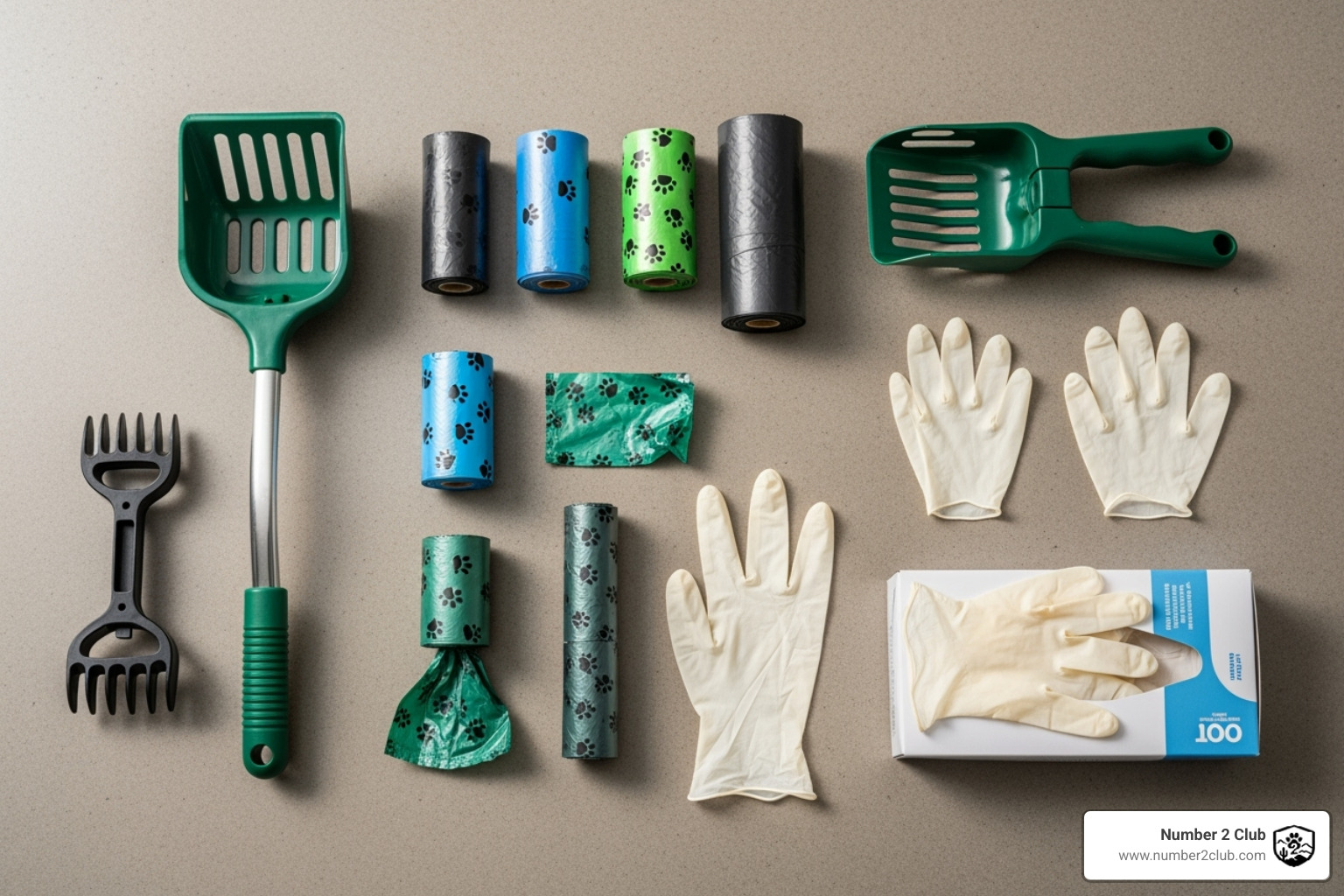
Choosing Your Tools of the Trade
Here are the essential tools for sanitary cleanup, for both outdoor and indoor messes:
- Poop Bags: You have several options. Plastic bags are common but persist in landfills. Paper bags are more eco-friendly but less durable for wet messes. Compostable bags, made from plant materials, are designed to break down completely but often require industrial composting facilities.
- Pooper Scoopers: These tools save your back and keep hands clean. Rake and bin scoopers are great for grass, while spring-action claw scoopers are useful for one-handed pickups on various surfaces. At Number 2 Club, our professionals often prefer shovels and gloves for maximum thoroughness, as rakes can be difficult to sanitize.
- Rubber Gloves: Non-negotiable for hygiene. Use disposable gloves or dedicated, reusable ones that are disinfected after each use.
- Disinfectant Wipes: Perfect for quick cleanups on tools or any surfaces that come into contact with waste.
- Enzymatic Cleaners: A game-changer for indoor accidents. These cleaners use enzymes to break down organic matter, eliminating both the stain and the odor at the source.
- DIY Solutions: For minor indoor issues, simple household items work well. A 50/50 mix of white vinegar and water can neutralize odors and stains. Baking soda is excellent for absorbing odors—just sprinkle, wait, and vacuum. Hydrogen peroxide can help lift organic stains from carpets.
The goal is to ensure the area is not just visibly clean but also sanitized to prevent the spread of harmful microorganisms. Our trained professionals prioritize sanitation and safety in every cleanup.
How to Clean Up Dog Poop from Any Surface
Knowing how to clean up dog poop from any surface is essential for pet owners. The key is to act fast to prevent stains, odors, and the spread of germs.
For comprehensive yard cleaning and to keep your outdoor spaces pristine, explore our dedicated services. Dog Poop Yard Cleaning
How to clean up dog poop from Grass and Concrete
For outdoor messes, a little know-how keeps your yard tidy.
- Grass: Use a pooper scooper or a bag to pick up solid waste without pressing it into the lawn. Working in a grid pattern helps ensure you don't miss any spots. For looser stool, gently scrape the surface to lift residue.
- Concrete, Gravel, or Decks: Scoop solid waste off the surface. For lingering odors on concrete or decks, sprinkle baking soda, let it sit overnight, and then sweep or rinse it away. On gravel, after removing solids, you can disinfect the area with a diluted bleach solution (1 part bleach to 32 parts water), followed by a thorough rinse. A metal brush can help with stubborn bits on hard surfaces.
How to clean up dog poop from Carpet and Upholstery
Indoor accidents require a careful approach to avoid permanent damage.
- Carpet: Act quickly. Wearing gloves, pick up solid waste without pressing it into the fibers. Scrape away looser messes with a putty knife. Blot the area with paper towels to absorb moisture. Next, apply a DIY solution of 2 cups cold water, 1 tbsp non-bleach dish soap, and 1 tbsp white vinegar. Let it sit for 10 minutes, then blot (don't rub) with a clean cloth. Rinse by blotting with a cloth dampened with cold water. For odors, sprinkle with baking soda, let it sit, and vacuum.
- Upholstery: Follow a similar process as with carpet. Remove solids, then blot the stain. Use a cleaner designed for upholstery, always testing it on an inconspicuous spot first. For leather, remove solids and apply a paste of 1 tbsp lemon juice and 1 tbsp cream of tartar. Let it sit for 15 minutes, then wipe with a damp sponge.
- Washable Fabrics: Remove waste, then blot the stain with a solution of 1 part laundry detergent to 10 parts water. Rinse and launder as usual.
Always disinfect the area after cleaning to prevent the spread of germs.
For tough indoor stains, consider professional advice like that from Diamond Carpet Care.
Proper and Safe Dog Poop Disposal Methods
Proper disposal is a crucial step that minimizes environmental impact and protects public health. Choosing the right method matters, especially considering the billions of plastic poop bags used annually.
From the Bag to the Bin: Disposal Do's and Don'ts
Here are the common disposal methods and what you need to know:
- Tossing It: Bagging waste and putting it in the trash is the most common method. While better than leaving it on the ground, standard plastic bags preserve waste in landfills for decades. Consider using compostable bags, but be aware they require industrial composting facilities to break down effectively.
- Flushing It: This is only an option if your local wastewater treatment plant can process animal waste. Never flush dog poop into a septic system, as it can cause clogs and contamination. Always check with your local water authority first, and never flush the bag.
- Burying It: This is generally not recommended. Dog waste contains pathogens that can survive in the soil for over a year. If you must bury it, dig a hole at least 6-8 inches deep and at least 200 feet away from water sources or vegetable gardens.
- Composting It: Dog poop composting is the most environmentally friendly solution, but requires specific methods. It requires a dedicated system that reaches temperatures over 165°F (74°C) to kill harmful pathogens. Standard home compost bins don't get hot enough. The resulting compost should only be used on non-edible plants.
Regardless of your chosen clean up dog poop method, always protect yourself. Wear gloves, wash your hands thoroughly afterward, and regularly clean and disinfect your tools.
When to Call for Backup: Special Cases and Professional Services
Some situations make clean up dog poop especially challenging, from messes on your pet to an overwhelming accumulation in the yard. Knowing when to call for backup can be a lifesaver.
For those times when a single, daunting cleanup is needed, we offer specialized services.
Cleaning Your Pet and Hiring the Pros
If your pet gets soiled, especially with long-haired breeds, act gently but effectively. Wearing gloves, remove as much solid waste as possible with a paper towel. An initial rinse with warm water outside can help. Then, use a pet-safe shampoo on the soiled area, lathering and rinsing well. A full bath may be necessary. Dry your dog thoroughly to prevent skin irritation.
For many, hiring Professional Poop Scoopers is about convenience, health, and peace of mind. Consider a professional service for these reasons:
- Time-Saving: Reclaim your weekends and spend more quality time with family and pets.
- Health and Safety: Professionals use proper disinfection protocols to prevent the spread of diseases like Parvovirus. They can also monitor waste for health indicators.
- Thoroughness: Trained scoopers use effective methods to ensure every piece of waste is removed, even from hidden spots. They are experts at handling difficult jobs like spring cleanups.
- Additional Services: Many companies offer odor elimination and yard sanitizing treatments.
- Peace of Mind: For residents in Litchfield Park, Goodyear, Verrado, and Buckeye, AZ, using a licensed and insured service ensures your property remains clean and safe.
Professional services offer flexible scheduling (weekly or one-time), remove waste from your property, and prioritize security, often with no need for you to be home. If you're tired of the chore, we've got you covered.
Frequently Asked Questions about Dog Poop Cleanup
Here are answers to some of the most common questions about how to clean up dog poop.
How often should I clean up dog poop from my yard?
Since most dogs poop once or twice daily, daily pickup is the gold standard for a safe and pleasant yard. If daily cleanup isn't feasible, aim for a thorough weekly cleanup at a minimum. This prevents parasites from developing in the waste, reduces environmental hazards, and stops your dog from tracking waste indoors. The longer poop sits, the greater the risk of it washing into storm drains or becoming a breeding ground for bacteria.
Can I use dog poop as fertilizer for my garden?
No. Dog poop should never be used as fertilizer, especially near edible plants. Unlike manure from herbivores, dog waste is full of harmful pathogens like E. coli, Salmonella, and various worms that can contaminate your soil and produce. It is also too acidic for most plants and can burn their roots.
What's the difference between biodegradable and compostable poop bags?
These terms are not interchangeable.
- Biodegradable bags are designed to break down over time, but they can leave behind microplastics and may not degrade effectively in a landfill.
- Compostable bags are made from plant-based materials and are designed to break down completely into organic matter. However, they typically require the high heat of an industrial composting facility to do so properly.
If you have access to a facility that accepts pet waste, compostable bags are the most eco-friendly choice.
Conclusion
From health risks to disposal methods, we've covered why it's crucial to clean up dog poop. This simple act is a powerful statement of responsible pet ownership. It's about more than a tidy lawn; it's about protecting your family's health, safeguarding local waterways, and being a considerate neighbor.
We understand that picking up after your pet isn't glamorous. With the right knowledge and tools, maintaining a clean, safe yard is achievable. However, if you'd rather not spend your free time on poop patrol, Number 2 Club is here to help.
We take the hassle out of this chore so you can focus on the joyous parts of having a pet. Ready to reclaim your yard and your weekends? We're here to make life easier, one scoop at a time.
For a consistently clean and safe yard, explore our Residential Dog Waste Removal Services.


